Local aggregates offer clear advantages for UK construction projects. The reduced transport distances mean lower costs and a smaller carbon footprint – particularly vital given Britain’s environmental targets. These materials consistently meet BSI standards and allow for swift quality checks at nearby quarries.
Choosing regional suppliers strengthens local economies, from Sussex to Yorkshire, whilst creating jobs in surrounding communities. Many UK quarries offer bespoke sizing and grading to match specific project requirements, whether for motorway surfacing or housing developments.
The proximity of local aggregate sources proves especially valuable during supply chain disruptions, ensuring steady material flow to keep projects on schedule. With rising fuel costs across Britain, the financial benefits of shorter delivery distances become increasingly significant.
Key Takeaways
Local Aggregates: Smart Choices for UK Projects
- Choosing local suppliers cuts transport costs by nearly a third, making real savings on building projects – think £300 less per lorry load on a typical housing development.
- The shorter the journey, the smaller the carbon footprint. Local sourcing means fewer lorries on motorways and less fuel burnt, plain and simple.
- When you buy from nearby quarries, you’re putting money straight back into your region. That means more jobs at local plants and better support for neighbourhood businesses.
- British Standards compliance means you’re getting properly tested materials that stand up to our weather – crucial for everything from garden patios to major construction.
- Local stone and aggregate naturally complement the surrounding architecture. A Yorkshire building looks right with Yorkshire stone, and Welsh slate suits Welsh homes perfectly.
Cost Efficiency of Local Aggregates
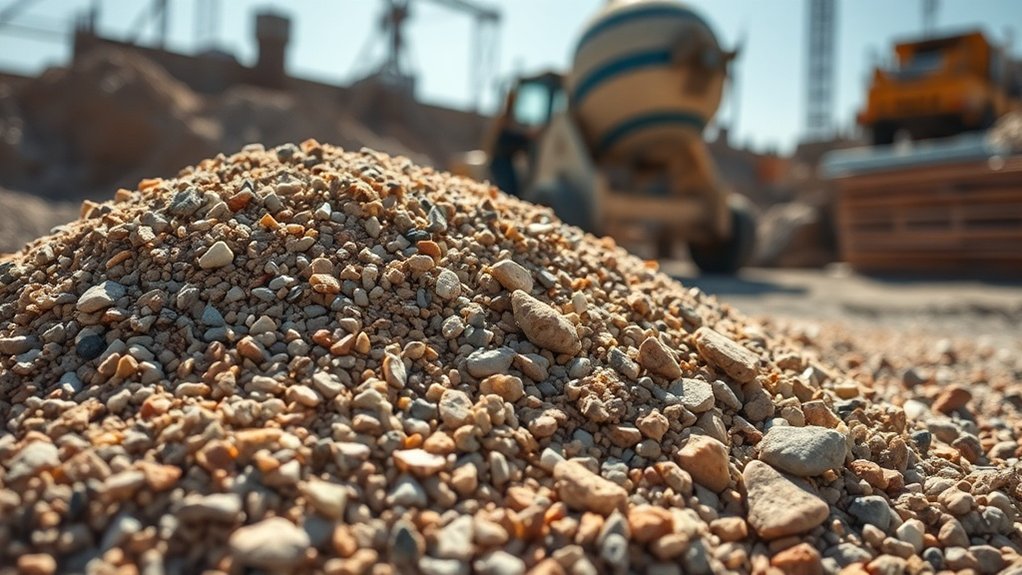
Using local aggregates significantly cuts costs by reducing transport distances. Research shows shorter delivery routes mean lower fuel costs and simpler logistics, creating notable savings for UK construction projects. Local suppliers often offer competitive rates, and bulk buying from nearby sources keeps material costs down. The benefits are practical: a building site in Manchester sourcing from Greater Manchester quarries, rather than Yorkshire, could save 30% on transport alone. Local sourcing also provides more stable pricing, as you’re less affected by national fuel price changes and transport delays. This approach helps with precise budgeting and reduces the risk of unexpected costs. Additionally, lower transportation costs enable you to allocate more of your budget to other essential project aspects. Investing in quality materials from local suppliers can enhance overall durability and long-term savings. You’ll spend less time waiting for deliveries and more time getting on with the job, which is especially valuable during Britain’s busy construction periods.
Environmental Sustainability Benefits
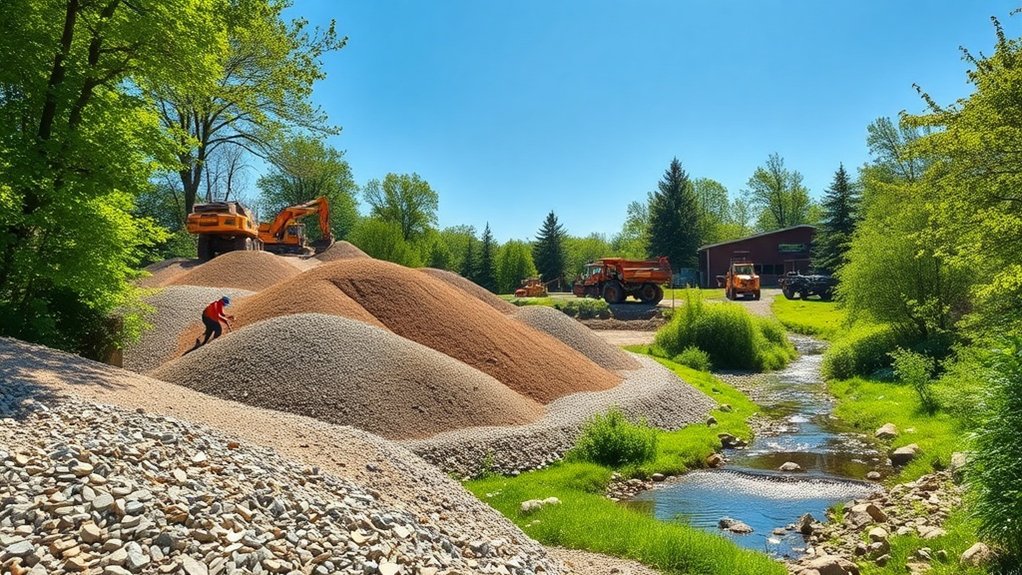
Using local aggregates delivers both cost savings and significant environmental benefits.
Reduced transport distances mean lower fuel use and fewer carbon emissions from haulage. Most building materials travel more than 2,400 kilometres, generating substantial CO2, but local sourcing dramatically cuts this impact. Additionally, local sourcing fosters a connection between materials’ origin and the end product, enhancing community ties. Moreover, selecting resin-bound gravel as a local aggregate option allows for better water infiltration, which improves drainage in your project area.
Local materials typically need less processing, saving energy and further reducing carbon footprint. This approach helps protect remote landscapes and maintains ecological balance by limiting environmental disturbance.
As these materials can be recycled, they reduce pressure on landfills and support the circular economy.
The environmental advantages extend to improved water drainage and soil health in your local area. For instance, locally sourced gravel and stone allow better natural water filtration than materials transported from abroad.
This practical approach to construction benefits both your project’s green credentials and the wider environment.
Positive Impact on Local Economy
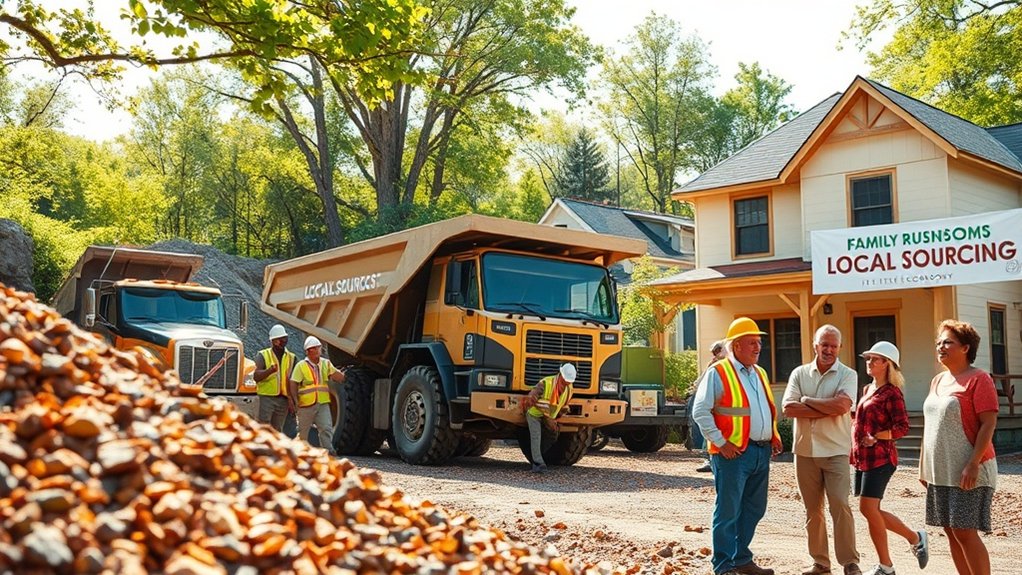
Using local aggregates strengthens your area’s economy by creating jobs across multiple sectors. Local sourcing supports employment in quarrying and transport whilst boosting businesses that rely on construction activity. This builds stronger supply chains within your region and generates tax revenue that funds local services like schools and roads. The knock-on benefits help build a more sustainable local economy, with money staying and circulating within your community rather than going elsewhere. Additionally, the economic impact of the aggregate industry significantly contributes to job opportunities and overall growth in the construction sector.
Community Economic Growth
Local aggregates drive community economic growth across the UK by generating vital revenue for public services and infrastructure.
When we support local quarries and aggregate suppliers, we strengthen our regional investment capabilities and diversify the local economy. These operations provide steady tax income for councils, helping fund everything from road maintenance to public facilities.
Aggregate sites serve as economic anchors in our communities, creating jobs and supporting related industries like haulage and machinery.
A quarry in Yorkshire, for example, might support dozens of direct jobs while sustaining work for local transport firms and equipment suppliers.
Using materials from nearby sources makes economic sense – it cuts transport costs, reduces our dependence on imports, and keeps money within our regional economy.
The continued success of British aggregate operations ensures our communities remain economically robust, providing stable employment and supporting sustainable growth for years to come. Furthermore, utilizing locally sourced materials aligns with environmentally friendly practices, promoting eco-conscious development and responsible resource management.
Job Creation Opportunities
The UK aggregates sector drives substantial employment across the nation’s economy. Currently employing over 100,000 workers, the industry offers stable, skilled positions throughout the country. Each aggregates role generates nearly five additional jobs in related sectors, bolstering local workforce growth. Regional sourcing reduces transport costs whilst maintaining steady employment in construction.
| Job Type | Direct Jobs | Indirect Jobs |
|---|---|---|
| Aggregate Extraction | 100,000 | 400,000 |
| Equipment Manufacturing | 20,000 | 80,000 |
| Transport Services | 30,000 | 120,000 |
| Maintenance Services | 15,000 | 60,000 |
| Supply Chain Support | 25,000 | 100,000 |
Investment in local aggregates strengthens regional economic resilience.
Quality and Supply Chain Advantages
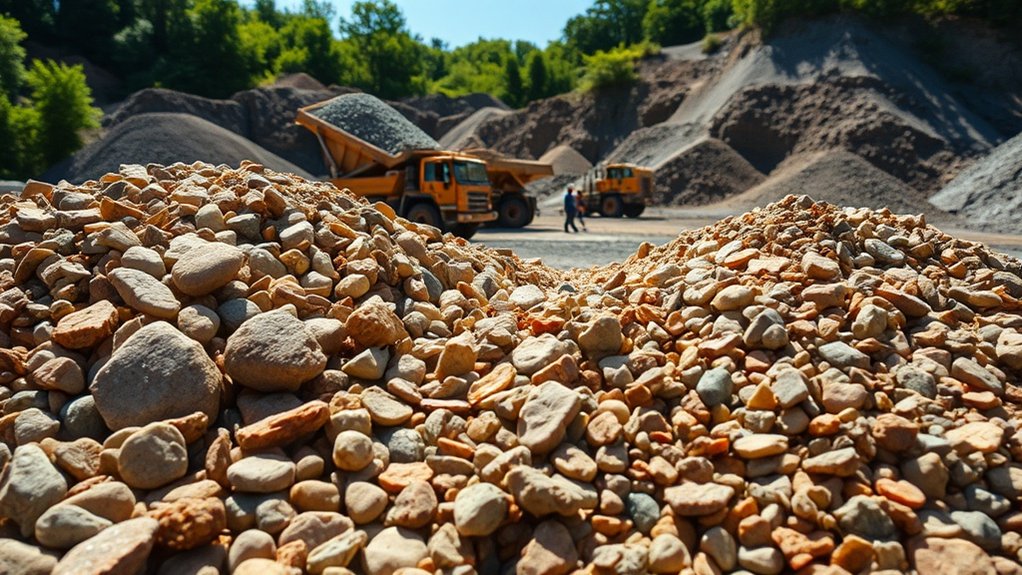
Regional Sourcing Benefits
Choosing locally sourced aggregates offers clear advantages for UK construction projects. Local materials meet British Standards and regional building regulations, whilst quarries within reach make quality testing straightforward. You can easily check vital properties like strength and grading to ensure the right fit for your build.
British aggregates suit our weather conditions and soil types better than imported alternatives. A builder in Manchester, for instance, can source limestone from the Peak District that’s proven to handle northern weather patterns effectively.
The shorter supply chain brings practical benefits – fewer lorry miles means lower costs and quicker deliveries to site. There’s also less chance of materials being damaged en route, which often happens with long-distance transport.
Local sourcing simply makes sense: better quality control, reduced costs and reliable delivery times keep projects running smoothly and on budget.
Limitations and Considerations of Local Aggregates

Regional availability and quality of local aggregates present key challenges for UK construction projects. Many counties lack reliable sources of suitable materials, particularly in urban areas where quarries are limited. The inconsistent nature of local supplies can impact both project scheduling and budgeting.
Material quality varies significantly across different regions – Devon’s limestone differs markedly from Yorkshire’s gritstone, for instance. These variations affect concrete strength, drainage properties and overall build quality. A quarry’s output might change throughout the year, meaning builders must regularly test materials and adjust their mixes accordingly.
Weather conditions and seasonal availability also play crucial roles. Winter often brings reduced quarry operations, whilst wet weather can affect aggregate quality.
Smart builders maintain relationships with multiple suppliers and factor these limitations into their planning.
Regional Supply Limitations
Regional Supply Constraints
Local aggregates often provide cost-effective building materials, but several regional supply issues create real challenges. The UK’s varied geology and strict planning regulations can restrict quarrying operations, causing material shortages. In built-up areas or protected landscapes, such as the Peak District or Areas of Outstanding Natural Beauty, local sourcing may be impossible.
| Constraint Type | Supply Impact |
|---|---|
| Extraction Limits | Reduced local availability |
| Planning Rules | Restricted quarry access |
| Market Forces | Price volatility |
These constraints typically increase project costs through higher haulage fees and compliance requirements. Understanding these limitations is vital when planning any construction work.
Quality Variability Issues
Regional supply constraints often mean using local aggregates, though varying quality creates distinct challenges. Local materials typically show inconsistent properties due to different mineral makeups. Harmful materials like shale and chert can weaken pavements, causing early damage. The shape and texture of these aggregates directly influence how well the mix works and performs.
Whilst some lower-quality aggregates can work in modified mixes, they need proper testing to ensure reliability. For example, a quarry might produce limestone that varies significantly between batches, requiring regular quality checks. Thorough testing is vital to confirm the materials meet your project’s standards.
Think of it like baking – just as flour quality affects bread, aggregate quality determines pavement durability. Regular testing and careful selection help avoid costly repairs down the line.
Role in Infrastructure and Regional Development

Local aggregates are vital for UK infrastructure and regional development, serving as the backbone of construction projects across our communities. Using local sources creates jobs and boosts the regional economy whilst reducing transport costs and environmental impact.
These materials are crucial for building and maintaining our roads, railways, schools and hospitals. Their availability directly shapes local planning decisions and influences how quickly essential projects can move forward.
When councils and developers source aggregates locally, they help balance development between urban and rural areas. The benefits are clear: shorter supply chains mean lower costs, reduced carbon emissions and more reliable delivery times.
This approach helps keep construction projects on budget and schedule whilst supporting British jobs and industry. Local quarries and aggregate suppliers also play a key role in strengthening regional economies and ensuring communities can meet their building needs efficiently.
Enhancing Project Budgets With Local Sourcing
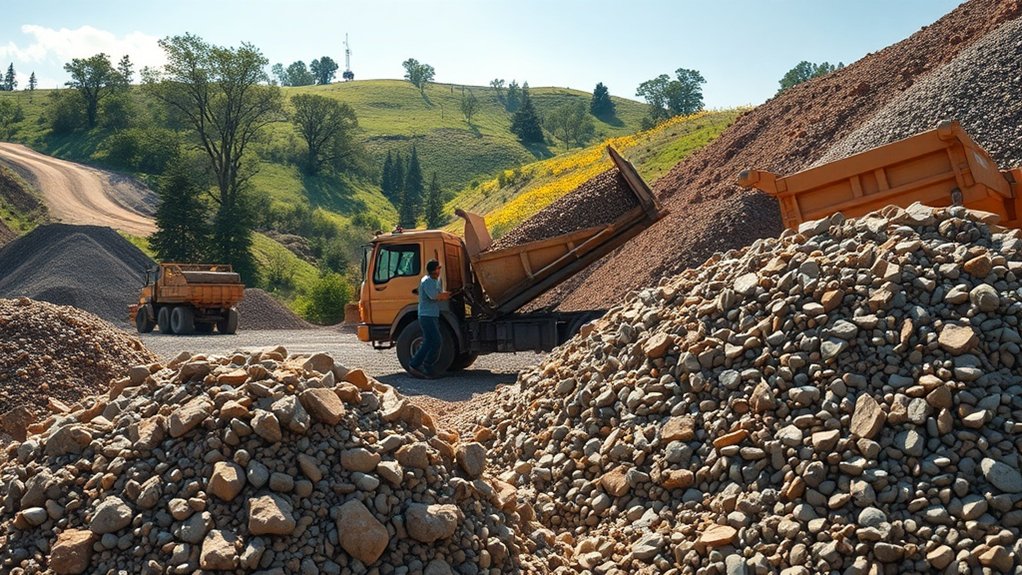
Local sourcing of aggregates offers substantial cost benefits for UK construction projects. Using materials from nearby quarries and suppliers dramatically cuts transport expenses, giving you more budget flexibility.
Rather than paying lorries to haul materials across the country, shorter delivery routes mean lower fuel costs and quicker deliveries – vital for keeping projects on track.
Working with local suppliers helps stabilise costs, particularly important given today’s volatile fuel prices. For instance, sourcing sand and gravel from a quarry 15 miles away rather than 100 miles away can slash delivery costs by up to 70%.
This predictability makes it easier to plan budgets and allocate funds to other crucial areas.
Regular, reliable deliveries from local sources reduce the risk of costly delays. Plus, supporting regional suppliers strengthens local economies, often leading to more competitive pricing and better service.
For UK projects, local sourcing simply makes sound financial sense, helping deliver projects on time and within budget.
Reducing Carbon Footprint Through Local Materials

Sourcing aggregates from local quarries slashes transport emissions and reduces your project’s carbon footprint.
Using recycled materials instead of new ones further cuts environmental impact whilst supporting the UK’s sustainability goals.
These practical steps help deliver greener construction without compromising build quality.
Transportation Emissions Reduction
Transport emissions pose a significant challenge in the aggregates sector, largely due to long-distance haulage of materials.
Sourcing aggregates locally reduces travel distances and cuts emissions substantially—even a modest 8-kilometre reduction makes a measurable impact.
Construction materials typically travel 2,400 kilometres, so using local sources dramatically lowers a project’s carbon footprint.
Smart logistics minimise fuel use and boost efficiency whilst reducing broader environmental effects.
The benefits extend to communities through better air quality and less traffic congestion.
Choosing local materials delivers both cost savings and genuine environmental improvements.
Recycled Material Utilization
Sourcing recycled materials from your local area cuts transport emissions and significantly reduces your project’s carbon footprint.
Key benefits of recycled aggregates include:
- Resource Conservation: Minimises extraction of new materials, protecting Britain’s natural resources.
- Construction Waste Reduction: Keeps waste out of UK landfills, easing pressure on waste management.
- Lower Emissions: Creating recycled aggregates produces fewer greenhouse gases than quarrying new materials.
- Cost-Effective: Recycled materials cost roughly 40% less per tonne – substantial savings for any construction budget.
Common examples include crushed concrete from demolition sites and reclaimed railway ballast, both widely used in UK construction projects.
Supporting Community Resilience and Growth
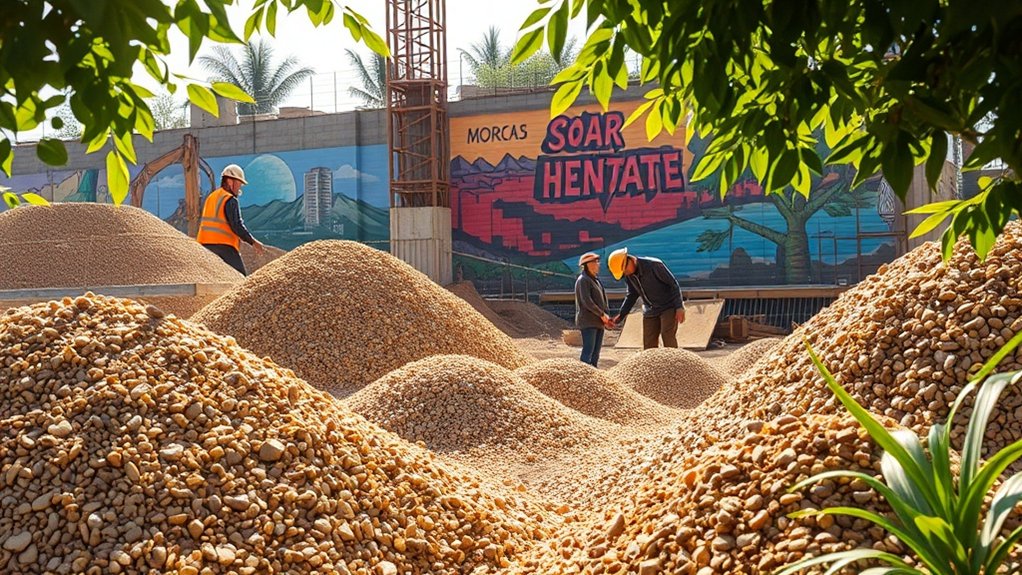
Regional aggregates offer vital support to local communities, boosting both economic stability and resilience. When communities take an active role in managing local resources, they create jobs, keep money in the area and maintain crucial tax income for local services. This reduces reliance on far-off suppliers – particularly useful during disruptions like severe weather or transport issues.
Local sourcing helps communities respond better to emergencies, whether it’s accessing materials quickly for road repairs or supporting building projects. For example, quarries in Cornwall supply materials for immediate flood defence work, whilst supporting dozens of local jobs.
Strong local industries lead to stronger communities. When aggregates are sourced locally, the benefits ripple through the area – from supporting local hauliers to providing materials for housing and infrastructure projects.
This practical approach helps build communities that can better withstand challenges and adapt to change.
Customization Opportunities With Local Producers

Local producers offer key benefits for customising aggregate materials to match specific project needs across the UK.
Working with local suppliers provides:
- Custom Blends: Mix aggregates to precise specifications – ideal for anything from garden paths to major construction work.
- Material Choice: Access to local sand, gravel, crushed stone and recycled materials, ensuring quality whilst supporting regional suppliers.
- Look and Feel: Choose specific sizes and colours to match your build – whether it’s matching local stone or creating distinct visual effects.
- Quick Supply: Shorter delivery times and less waste through pre-mixed batches, particularly useful for time-sensitive builds.
These options help streamline projects whilst ensuring aggregates perfectly match your requirements, improving both practical performance and visual appeal in British construction projects.
Frequently Asked Questions
How Do Local Aggregates Compare in Price to Imported Materials?
Local aggregates typically cost less than imported materials across UK markets due to lower transport and handling costs. For example, quarried stone from Yorkshire proves cheaper than similar materials imported from Spain or Portugal. When planning construction projects, sourcing from nearby quarries and suppliers generally offers better value for money.
What Types of Projects Benefit Most From Local Aggregates?
Local aggregates prove vital for road works and landscaping schemes across the UK. These materials cut transport costs, ensure consistent supply and maintain quality standards – particularly beneficial for council projects, housing developments and motorway maintenance. Using nearby quarries and suppliers helps deliver projects on time whilst supporting regional businesses.
Are There Specific Regulations for Using Local Aggregates?
Using local aggregates in the UK requires strict compliance with specific regulations. You’ll need proper permits from your local council and relevant government bodies. Common requirements include quarrying licenses, transport permits and environmental impact assessments. Check with your local authority, as rules often vary by region. Most projects must follow sustainable extraction guidelines and meet British Standards for aggregate quality.
How Can I Find Local Aggregate Suppliers in My Area?
Finding local aggregate suppliers in the UK is straightforward through several reliable methods:
Check trade directories like Yell and Thomson Local, searching by postcode. Browse construction-specific websites such as the Mineral Products Association (MPA) directory. Ask local builders’ merchants and construction firms for their trusted suppliers. Most quarries and suppliers list their services on Google Maps, making it easy to spot nearby options.
Ring potential suppliers to enquire about:
- Material grades available
- Delivery options
- Minimum order quantities
- Current pricing
- Collection points
Consider joining local construction groups on social media for first-hand recommendations from other professionals in your area.
What Quality Standards Do Local Aggregates Need to Meet?
Local aggregates must meet stringent British Standards (BS EN) requirements, with essential quality checks to ensure reliability. Standard testing includes particle size grading, Los Angeles wear testing, and frost resistance assessment. These measures guarantee that aggregates can handle British weather conditions and maintain their strength in construction projects, from garden paths to major roadworks.
Conclusion
Using local aggregates offers practical benefits beyond cost savings and quality control. The approach reduces transport emissions whilst supporting regional businesses and jobs. These materials often complement local architecture and building styles, creating more authentic results. Local sourcing also ensures reliable supply chains and helps maintain the area’s construction heritage. The shorter delivery distances and established supplier relationships make projects more efficient and dependable.
